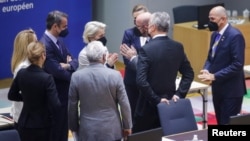European Union leaders have agreed to impose sanctions against Russia that they say will have “massive and severe consequences” in response to President Vladimir Putin's "barbaric" invasion of Ukraine.
The punitive measures target Russia’s financial, energy, and transport sectors and add restrictions on exports and financing. They also add more Russian individuals to a previously announced sanctions list.
The leaders of the 27-nation bloc agreed to the sanctions on February 24 at an emergency summit in Brussels called to condemn the invasion.
In a statement agreed at the summit, EU leaders said the new round of sanctions "will impose massive and severe consequences on Russia for its action, in close coordination with our partners and allies."
The EU aims to freeze Russian assets held within the bloc and halt Russian banks' access to European financial markets as part of what EU foreign policy chief Josep Borrell described as "the harshest package of sanctions we have ever implemented."
"Our sanctions will hurt the Russian economy in its heart," said Belgian Prime Minister Alexander De Croo.
Ukraine and the Baltic states say Russia should be cut off from the SWIFT global interbank transfer system, but when asked about this, German Chancellor Olaf Scholz said: "We need to keep sanctions ready for later times."
Speaking on February 25, French Finance Minister Bruno Le Maire said that the option of cutting off Russia from the SWIFT system remained open, but that he viewed this as a "last resort".
U.S. President Joe Biden, who also announced another round of harsh U.S. sanctions earlier on February 24, said the United States would not restrict access to SWIFT for now.
The EU sanctions must still be legally approved and published before they become effective.
The EU leaders say they also want to draw up sanctions against Belarus because of its close links to Russia.
The EU had already approved a first round of sanctions on February 23, including blacklisting Russian lawmakers, government officials, and businesses.
Russian Defense Minister Sergei Shoigu, a top adviser to President Vladimir Putin, and all 351 lawmakers who voted in favor of recognizing the independence of Donetsk and Luhansk in eastern Ukraine were among those targeted in the first round.











